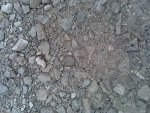I'll echo the others...I don't know that a paved driveway would add to the resale value, but I'd think it would add to the curb appeal. Either concrete or asphalt will eventually need maintenance, but how much and how often will depend on the quality of the installation.
... Make sure they do a good job on preparing the roadbed under it.
That's important advice. The base is what makes or breaks a paving job. A lot of residential pavers do a poor job of base preparation. Blade it flat, roll the walk-behind compactor over it a time or two, and call it good. The job looks OK for a few years (maybe), but usually won't hold up over the long run. Just off the top of my head, I'd say a good contractor will spend 70% to 80% of the time on the job preparing the base, and the rest laying the surface. (Been a lot of years since I was on a paving job, so there's some margin of error in those numbers.)
...I think the only way I'd be able to successfully pave mine (asphalt, BTW) would be to excavate about 1½~2 feet and backfill with decreasingly sized stone - like 2~4" goonies, then 1~2 crush, then 3/4" crush - before topping it with several inches of asphalt. All that seems very labor intensive, and also very expensive.
So, any advice or suggestions?
As Chuck said, you're on the right track, but doing it right won't be cheap. I've seen the same sort of treatment done for roadways and concrete building foundations in sloppy clay conditions. Another possibility, depending on whether your local contractors can do it, would be
soil cement. It's used as a subbase, but it would bridge the clay and provide a solid foundation for your asphalt or gravel. Keep in mind that the base needs to extend out from the roadbed at a 1:1 ratio, so for example if you have 2' of base, the width of the excavation for that base needs to be 4' wider than the paved surface. (The compression forces on pavement are just like on wood clamps, they fan out as they travel.) When we see a 10' wide driveway, a paving contractor sees a 14' wide trench. This adds to the cost of the base preparation.
To a large extent, the "best" solution will differ for everybody, depending on their soil conditions. A qualified soils engineer could probably recommend several option, but engineers are usually not in a driveway budget. That's where working with a local paving company with a good track record can pay off. They've built enough jobs that
are designed by engineers that they know what works and what doesn't.



